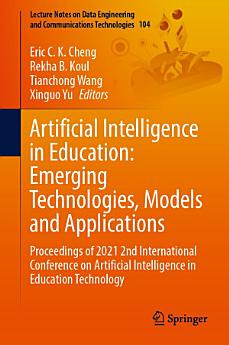Artificial Intelligence in Education: Emerging Technologies, Models and Applications: Proceedings of 2021 2nd International Conference on Artificial Intelligence in Education Technology
इस ई-बुक के बारे में जानकारी
The book provides a comprehensive picture of the current status, emerging trends, innovations, theory, applications, challenges and opportunities of currentAI in education research. This timely publication is well-aligned with UNESCO’s Beijing Consensus on Artificial Intelligence (AI) and Education. It is committed to exploring how best to prepare our students and harness emerging technologies for achieving the Education 2030 Agenda as we move towards an era in which AI is transforming many aspects of our lives. Providing a broad coverage of recent technology-driven advances and addressing a number of learning-centric themes, the book is an informative and useful resource for researchers, practitioners, education leaders and policy-makers who are involved or interested in AI and education.
लेखक के बारे में
Dr. Eric Cheng is a specialist in educational management, knowledge management and Lesson Study. He is currently associate professor of the Department of Curriculum and Instruction of the Education University of Hong Kong. He is now serving as a school manager of Pentecostal Yu Leung Fat Primary School, C.C.C. Tam Lee Lai Fun Memorial Secondary School and E.L.C.H.K. Lutheran Secondary School. He is an Associate Editor of the International Journal of Educational Administration and Policy Studies (IJEAPS), a visiting scholar of Nagoya University, Aichi University of Education and Budapest Metropolitan University, an external examiner of The Open University of Hong Kong on the Master of Education programme and doctoral thesis examiner of Nottingham University on Doctor of Education program.
Eric earned his Doctor of Education in education management from the University of Leicester. His publication covers the areas of school management, Learning Study and knowledge management. He is the author of an academic book entitled Knowledge Management for School Education published in 2015 by Springer. Eric has been successful in launching more than 10 research and development projects with external and competitive funds in the capacity of Principal Investigator (PI). He is a PI of a Research Grants Council GRF funded project. He was a PI of University Grants Committee funded Communities of Practices project, Quality Education Fund project, and Standing Committee on Language Education and Research project. He received the Knowledge Transfer Project Award from HKIEd in 2014-15, Scholarship of Teaching Award in 2013-14 and Knowledge Transfer publication Awards in 2012-13 form Faculty of Human Development of HKIEd.Dr. Rekha Koul is Dean International, Faculty of Humanities and Associate Professor at STEM Research Group, School of Education, Curtin University, Australia. She has nearly three decades of teaching and research experience. Her expertise lies in the development, refinement and validation of questionnaires; investigations of the effects of classroom environments on student outcomes; evaluation of educational programs; teacher-action research aimed at improving their environments and evaluation of curriculum. She has successfully secured many local, national and international research grants to the value of over one million dollars. Her publication record includes two books authored, seven books edited, eight book chapters and many journal articles published in peer-reviewed journals. She has delivered invited key note addresses and also conducts teacher professional learning workshops.
Rekha convenes International Conference on Science, Mathematics and Technology Education (icSTEM), a biannual conference in different parts of the world and has established a Learning Environment Research Centre in Indonesia.
She was the elected chair of Jumki Basu Scholarship (NARST 2016-18) and Programme Chair for Learning Environment SIG (AERA).
Dr. Tianchong Alex Wang is currently a Post-doctoral Fellow in the Department of Curriculum and Instruction at The Education University of Hong Kong. He received an EdD degree from the Chinese University of Hong Kong, an MSc degree from the University of Hong Kong, and a BA Hons degree from Hong Kong Baptist University. Dr Wang has a solid technical background in Information and Communication Technologies (ICTs); he is holding a number of professional qualifications such MCP, MCSA, MCSE, MCDBA, MCTS, MCITP, ACSP, ACTC, and THXCP. He is also a member of IEEE. As an advocate of using digital technologies to enhance education quality and inclusion., Dr Wang’s current research interests include AI in assessment, blended learning, mobile learning, flipped classrooms, ICT-enabled learning at scale, and digital learning for development. He has been participating research projects commissioned or supported by international organisations such as UNESCO, IDRC and The HEADFoundation as well as local research funding bodies such as Education Bureau (EDB) and The University Grants Committee (UGC) of Hong Kong. Dr Wang is a passionate teacher educator. He serves as a PT Lecturer at the University of Hong Kong who teaches in the MSc (IT in Education) programme as well as a resource person who conducts teacher capacity-building activities for international organisations and government agencies.
Dr. Xinguo Yu is the dean and Professor of CCNU Wollongong Joint Institute and Professor of National Engineering Research Center for E-Learning at Central China Normal University, Wuhan, China, senior member of both IEEE and ACM, and an adjunct professor of University of Wollongong, Australia. He is a member of steering board of PSIVT conference and a member of steering board of Smart Educational Technology Branch Society under Automation Society, China. He received Ph.D. degree in Computer Science from National University of Singapore. His current research mainly focuses on intelligent educational technology, educational robotics, multimedia analysis, computer vision, artificial intelligence, and virtual reality. He has published over 100 research papers. He is an Associate Editor of International Journal of Digital Crime and Forensics,was Guest Editor of Multimedia Systems and International Journal of Pattern Recognition and Artificial Intelligence. He is general chair of International Conference on Internet Multimedia Computing and Service 2012 and Pacific-Rim Symposium on Image and Video Technology 2017, and program chair of International Conference of Educational Innovation through Technology 2015, Pacific-Rim Symposium on Image and Video Technology 2015.










